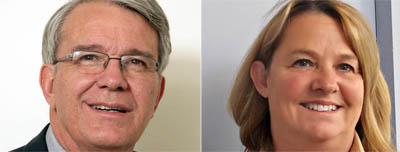Latest News Archive
Please select Category, Year, and then Month to display items
22 September 2021
|
Story Michelle Nöthling
|
Photo Supplied
 Annemarie Le Roux.
Annemarie Le Roux.
“I love working with children.” This is one of the first things Annemarie le Roux mentions when asked to describe herself. This love for children propelled Annemarie into the field of education and she graduated in 2006 with a BEd in Foundation Phase at the UFS. Annemarie immediately immersed herself in the Deaf community, enriching the lives of children at the Thiboloha School for the Deaf in Qwaqwa and the De la Bat School for the Deaf in Worcester.
The academic world enticed Annemarie back to the University of the Free State (UFS) and she was appointed as a junior lecturer in the Department of South African Sign Language (SASL) and Deaf Studies in 2013. Going from strength to strength, Annemarie completed her master’s degree in SASL in 2019, and published an
article earlier this year that she co-wrote with Marga Stander. In this article, they found that SASL “has become an increasingly popular language that hearing university students want to learn as a second language” and subsequently explored different teaching methods used for this emerging group of interested students.
Although now firmly established in academia, Annemarie is still committed to the practical application of SASL. “I am closely involved in student and community engagement through the
SIGNALS Sign Language student association that helps empower the Deaf community and South African Sign Language.” She also interprets for the Deaf community whenever she gets an opportunity, as well as for Deaf students in class and meetings.
On the importance of Sign Language and the recognition of the Deaf community in South Africa, Annemarie believes it will open greater opportunities for development. “More people will be able to learn SASL, and it might even become a subject in school for hearing children.”
UFS welcomes two new deans in the faculties of Theology and Law
2014-08-04
 |
The university council has approved the appointment of two deans: Prof Fanie Snyman, at the Faculty of Theology and Prof Caroline Nicholson, at the Faculty of Law.
Both professors offer the university a wealth of knowledge and experience in research and teaching.
Prof Fanie Snyman
Prof Snyman joined the university in 1984 as a senior lecturer in the Department Old Testament. His career followed a steadfast ascent which led him to attaining the title of professor and head of department the following year. On 1 July 2013, Prof Snyman took on the additional role of acting dean of the faculty.
As dean, he set out a clear vision of academic leadership with four primary focus areas: research, teaching and learning, internationalisation and regional engagement.
He is the author of eight books and contributed to seven internationally- and twelve nationally-published books. He has published nine articles in international journals and about 60 more in accredited journals.
Prof Snyman proposes to bring staff members together to extensively rethink and reposition the faculty in terms of identity, transformation and the way forward. “We live in a complex world, characterised by uncertainty and in constant change. This calls for complex but also innovative solutions,” he says.
Prof Caroline Nicholson
Prof Caroline Nicholson was born in Scotland and came to South Africa as a young child. She obtained her BProc and LLB degrees at the University of the Witwatersrand and completed her articles of clerkship at Chernin’s in Hyde Park Corner, Johannesburg. Prof Nicholson was admitted as both an attorney and notary public of the then Supreme Court of South Africa in 1986.
In 1986 she joined the University of South Africa (UNISA ) as a lecturer and remained there until 1999. During this time she completed an LLM in Banking Law and an LLD in Comparative Conflict of Laws – focusing on international parental child abduction. During the same year she moved to the Faculty of Law at the University of Pretoria where she worked for the last fifteen years. In 2003 she completed a Postgraduate Diploma in Alternative Dispute Resolution (ADR) and has an abiding interest in ADR, especially within the Family Law context.
Prof Nicholson has produced numerous articles and research presentations on a variety of legal subjects. Her primary areas of interest are, however, legal education and child law. She is known both nationally and internationally for her research contributions.